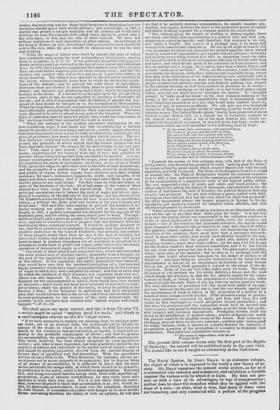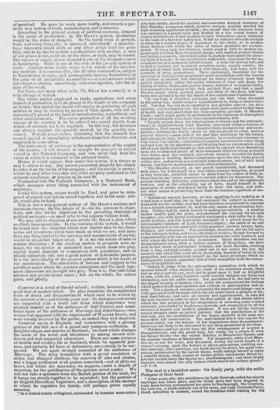The Social System, by ;JOHN GRAY, is an elaborate volume,
the object of which is to expound to the world a new theory of so- ciety. Mr. GaAs' examines the present social system, as far as it is connected with industry and commerce, and exhibits in a forcible manner the various evils to which it is liable. He does not pre- sent us with a view of its advantages, by way of compensation ; neither does he show the remedies which may be applied with the hope of a cure,—or state, what is true, that many of these vices are transitory, and only connected with a portion of the progress
of mankind. He .goes to work more boldly, and invents a per- feetly new system of trade, manufactures, and commerce.
According to the 'present system of political economy, demand is the cause of production: in Mr. GRAY'S system, production would be the cause of demand. As the world wags at present, trade and every thing else is managed individually : a manufac- turer fabricates broad cloth or any other article until the price falls, and as he has to sustain a competition with another, a race of low prices is run, until one or the other, or both, may he ruined. The excess of supply above demand is one of the frequent causes of bankruptcy. Such is one of the evils of the present system of trade. Another more fertile cause is the nature of the circulat- ing medium : it is a commodity, like all other commodities, subject to fluctuations in value, and consequently causing fluctuations in the price of all marketable commodities,—a circumstance which introduces confusion, uncertainty, and even injustice, into the af- fairs of the world.
For these, and many other evils, Mr. GRAY has a remedy in a total change of system.
The whole capital employed in trade, agriculture, and every branch of production, is to be placed in the hands of one company or board: this capital the board will employ in producing all such articles as may be wanted, by means of their agents, who will be conveniently placed at the head of manufacturing, agricultural, and other establishments. The entire production of all the working classes of the country is to be entered into grand depots, from which all retailers are to be supplied. In this way, the directors can always regulate the quantity wanted, by the quantity con- sumed. If stock accumulates, indicating that the demand has ceased, capital is immediately withdrawn from that direction and employed in some other. The instrument of exchange is the representative of the capital of the country : it will consist of receipts for property or capital vested in the National Company, and can never Vary from the value at which it is estimated in the national books.
Hence it would appear, that under this system, it is always as easy to sell as to buy. Any person possessing property has simply to enter it on the books of the company ; and his receipt is money, which he may either turn, into any other property contained in the national warehouse, ear employ as he sees fit. Connected with tire National Company, is a National Bank, which manages every thing connected with the instrument of exchange. Under this system, waees would be fixed, and price be com- posed of capital and labour added together, and in the same arti- cle would also be fixed.
This is but a very general outline of Mr. GRAY'S curious and ingenious theory : for the details of • it—for his answers to objec- tions, and also for his objections to the prevailing doctrines of political economy—we must refer to the copious volume itself. We may add an objection of our own to Mr. GRAY'S plan, which we think insurmountable. In the working of his system, it would
be found that the stimulus which now excites men to the disco- veries and inventions which have made us what we are, and more than any thing tended to the increase and accumulation of capital, would be altogether taken away. It is not the nature of man to remain stationary : if the exciting motive to progress were re-
laxed, the vis inertice of contented man would come into play, capital would diminish in comparison with population, and we should ultimately sink into a great nation of systematic paupers. It is the individuality of the present system which is the secret of
our acceleration. The alternative of fortune and beggary is the condition under which the greatest enterprises and the most inge- nious discoveries are brought into play. True it is, that individual miseries and private losses occur ; but on the whole, the nation gains, and greatly.



























 Previous page
Previous page